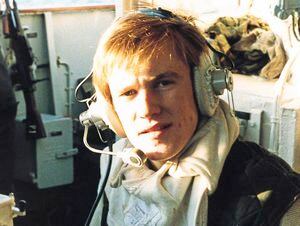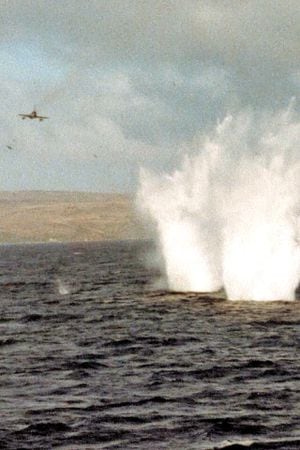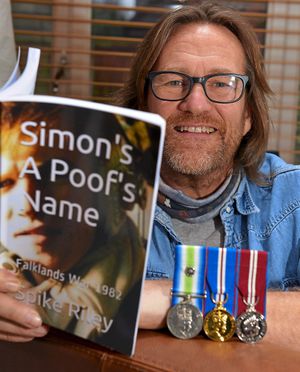Simon's war wasn't all doom and gloom
Falklands War veteran Simon Riley has penned his memoirs 35 years after the conflict which he remembers was peppered with both loss and laughter.

It’s not a book title that suggests that the author is a Falklands War veteran who survived an air attack by five Skyhawks at close range.
But Simon’s A Poof’s Name is the title that 55-year-old Simon Riley wanted for his no-holds-barred memoir of his time in the Royal Navy, including his stint on active service in the Falklands on HMS Plymouth.
“I even got turned down by some publishers on the grounds the title wasn’t politically correct,” he says. “But I was determined to keep it. I felt it reflected the tone of the book.
“It wasn’t all doom and gloom, there were a lot of laughs.”
The title is a direct quote from his boss on board ship, Radio Supervisor Wright, a burly Scot who from then on always referred to him by his nickname of Spike.
The book contains many anecdotes about life on the ocean wave on a boat staffed by a crew that was 75 per cent Glaswegian. There is even humour in the one stand-out story of the day HMS Plymouth was bombed – and hit – by Argentinian fighter pilots.
Simon had not joined up in December 1979 expecting to go to war.
“I was looking for adventure, and joining the navy, visiting different parts of the world, seemed like a fairly safe bet,” he recalls, sitting at the kitchen table of his neat Wombourne house.
But in April 1982, as his unit were on spring training in Gibraltar, looking forward to an imminent five-month deployment to the West Indies, news came over the World Service of an invasion of Britain’s remote Falkland Islands.
“We wondered why on earth anyone would want to invade an island in the Outer Hebrides, says Simon, at the time a 20-year-old radio operator. “We had no idea where the Falklands were.”
But they had time to find out on the three-week 8,000 mile journey to the tip of South America at the head of the Task Force.
Once there, they spent long days on watch, broken up only by the occasional daylight air raid on San Carlos Bay, known as Bomb Alley.

It was June 8 when that routine suddenly changed and HMS Plymouth came under fire as it nosed out of the bay to fire some 4.5in shells to the other side of the islands where there was reported to be an enemy observation point.
“I remember looking left and seeing five jets coming towards us,” he says.
“Out there, we were like sitting ducks. I sent out the emergency signal on the radio and gave our bearing.
“The ship turned around and we were at full steam heading back to Bomb Alley when they swooped again and dropped five 1,000lb bombs on us, as well as 30mm and 20mm cannon shells which smashed into the port side.”
Two of the bombs narrowly missed, but two more hit the quarter deck and another went through the funnel.
Amazingly, amid the noise and chaos on board, the young seaman had reached for his camera and taken pictures of the Skyhawks’ approach.
But for the next few hours, it was all hands on deck as thick, acrid fumes filled the ship from fires in the petty officers’ mess and the dining hall.
The ship had also started to list as it took in water.
“The smoke was so thick you couldn’t see through it. I remember throwing my gas mask to one of the lads in the tiller house so he could at least steer the ship.

“A couple of the guys in the turret got injured but not too seriously. We were so lucky – it was ridiculous.
“At the time it was a massive adrenalin rush.”
Thirty-five years on, after time spent running a bar in Spain, working in commodity markets in London and walking the beat as a police officer stationed in West Bromwich, he decided to write down his experiences, his memory backed up by a diary he kept at the time.
“I’d got all these stories in my head that I wanted to get down on paper, and I wanted to make my story different from other Falklands memoirs by making it light-hearted.
“One publisher said there were already too many books about the Falklands but this is my personal story, very much written through the eyes of a 20-year-old juvenile.
“I write about getting into scrapes and getting drunk in the build-up to the Falklands.
“When the war came, the ship was lucky. We knew the Sheffield had been sunk, we’d watched the Ardent sink and we saw the Antelope get hit. We managed to evade the same fate.
“This is not my attempt to write a bestseller, although that’s the description Amazon have given it. I wanted to do it for me more than anything else, it’s my small way of leaving a bit of a legacy.”
Now a family man, and a remarkably youthful-looking grandfather of-two, he still meets up with his former shipmates at regular reunions.
“We never did get to the West Indies,” he grins.





